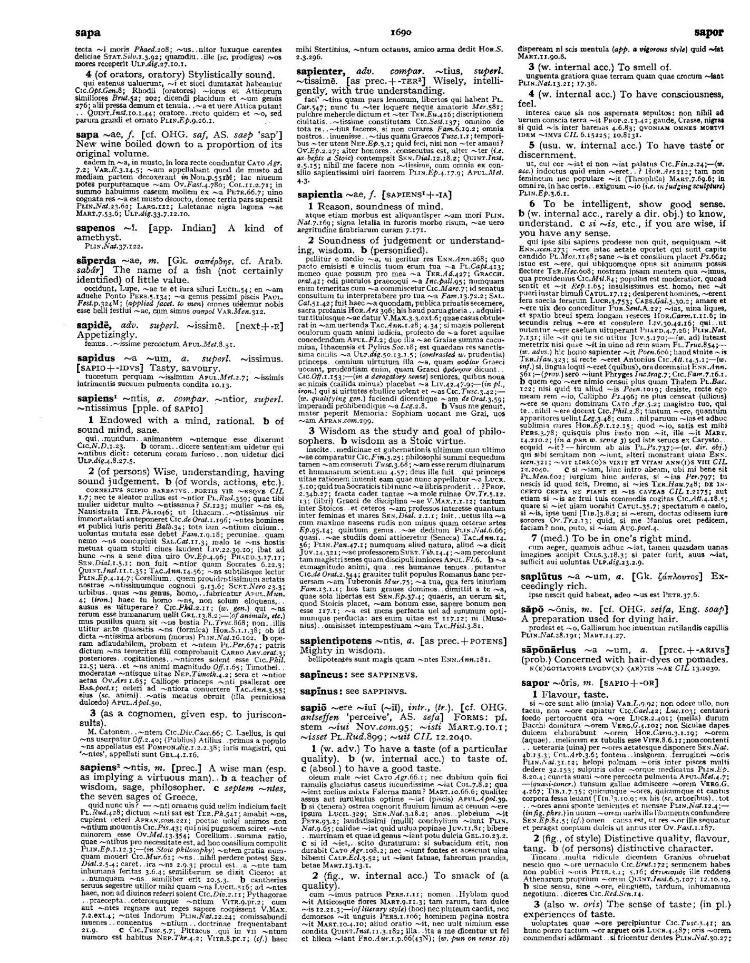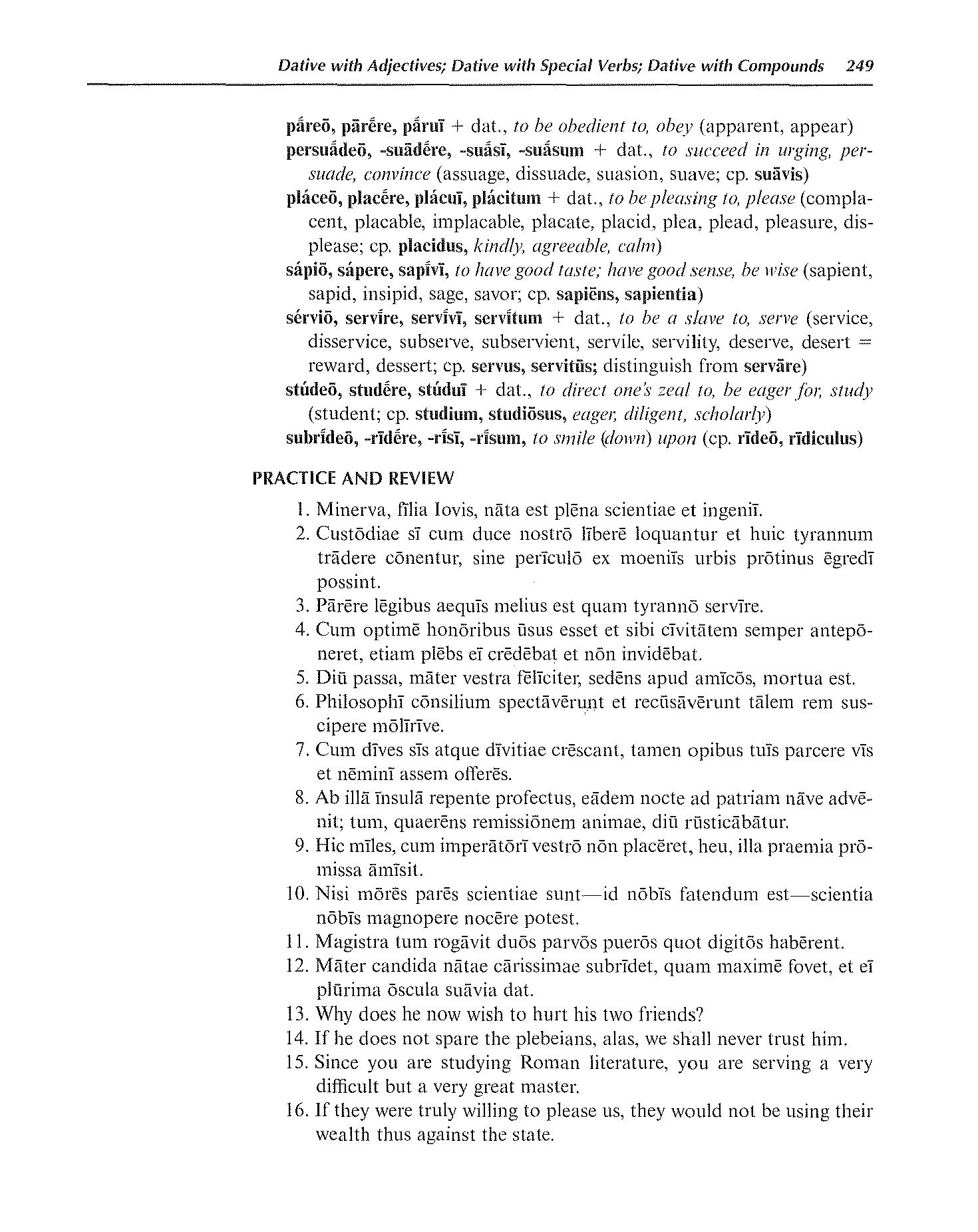
page_listing.tpl
page_subListingDetails.tpl
sub_listingDetails_style1.tpl
sub_listingDetails.title.tpl
sapere to have good sense
sapere is a Latin Verb that primarily means to have good sense.
Definitions for sapere
Wheelock's Latin
Verb
- 1
to have good taste, have good sense, be wise
English derivatives:
sapient sapid insipid sage savor
Oxford Latin Dictionary
Verb
- 1
To have a taste of (of a particular quality). (b) (w. internal acc.) to taste of. (c) (absol.) to have a good taste.
- 2
(fig., w. internal acc.) To smack of (a quality).
- 3
(w. internal acc.) To smell of.
- 4
(w. internal acc.) To have consciousness, feel.
- 5
(usu. w. internal acc.) To have taste or discernment.
Sentences with sapere
Latin to English
Scribendi recte sapere est et principium et fons.Compare Of writing well the source and fountainhead is wise thinking.
Dimidium facti qui coepit habet; sapere aude; incipe! Qui recte vivendi prorogat horam, rusticus exspectat dum defluat amnis; at ille labitur et labetur in omne volunilis aevum.Compare He who has begun his task has half done it. Have the courage to be wise. Begin! He who keeps putting off the moment of reform is like the countryman waiting for the river to run by. But the river slides and rolls, will slide and roll on to all time.
Populus Romanus eo invictus sum sentio, quod in secundus res sapio et consulo memini.Compare I think that the Roman nation is on this account unconquered, because in prosperity it remembers to be wise and provident.
Conjugation table for sapere
Cactus2000
| ACTIVE | |
| Indicative present | Indicative imperfect |
| sapiō sapis sapit sapimus sapitis sapiunt | sapiēbam sapiēbās sapiēbat sapiēbāmus sapiēbātis sapiēbant |
| Indicative perfect | Indicative pluperfect |
| sapīvī / sapiī sapīvistī / sapiistī sapīvit / sapiit sapīvimus / sapiimus sapīvistis / sapiistis sapīvērunt / sapīvēre / sapiērunt / sapiēre | sapīveram / sapieram sapīverās / sapierās sapīverat / sapierat sapīverāmus / sapierāmus sapīverātis / sapierātis sapīverant / sapierant |
| Indicative future | Indicative future perfect |
| sapiam sapiēs sapiet sapiēmus sapiētis sapient | sapīverō / sapierō sapīveris / sapieris sapīverit / sapierit sapīverimus / sapierimus sapīveritis / sapieritis sapīverint / sapierint |
| Subjunctive present | Subjunctive imperfect |
| sapiam sapiās sapiat sapiāmus sapiātis sapiant | saperem saperēs saperet saperēmus saperētis saperent |
| Subjunctive perfect | Subjunctive pluperfect |
| sapīverim / sapierim sapīveris / sapieris sapīverit / sapierit sapīverimus / sapierimus sapīveritis / sapieritis sapīverint / sapierint | sapīvissem / sapiissem sapīvissēs / sapiissēs sapīvisset / sapiisset sapīvissēmus / sapiissēmus sapīvissētis / sapiissētis sapīvissent / sapiissent |
Infinitive present sapere Infinitive perfect sapīvisse / sapiisse Infinitive future - | Imperative present sape sapite Imperative future sapitō sapitō sapitōte sapiuntō |
| PARTICIPLE | ||
| Participle present active | ||
| sapiēns | sapientēs | |
| sapiēns | sapientēs | |
| sapiēns | sapientēs | |
| sapiēns | sapientēs | |
| sapiēns | sapientēs | |
| Participle future active | ||
| - | - | |
| - | - | |
| - | - | |
| - | - | |
| - | - | |
| Participle perfect passive | ||
| - | - | |
| - | - | |
| - | - | |
| - | - | |
| - | - | |
| Gerundive | ||
| sapiendus | sapiendī | |
| sapiendus | sapiendī | |
| sapiendus | sapiendī | |
| sapiendus | sapiendī | |
| sapiendus | sapiendī | |
| Gerund | Supine | |
| sapere | - | |
| sapere | - | |
| sapere | ||
| sapere | ||
| sapere | ||
| PARTICIPLE | ||
| Participle present active | ||
| Nom. | sapiēns | sapientēs |
| Gen. | sapientis | sapientium |
| Dat. | sapientī | sapientibus |
| Acc. | sapientem | sapientēs |
| Abl. | sapiente | sapientibus |
| Participle future active | ||
| Nom. | - | - |
| Gen. | - | - |
| Dat. | - | - |
| Acc. | - | - |
| Abl. | - | - |
| Participle perfect passive | ||
| Nom. | - | - |
| Gen. | - | - |
| Dat. | - | - |
| Acc. | - | - |
| Abl. | - | - |
| Gerundive | ||
| Nom. | sapiendus | sapiendī |
| Gen. | sapiendī | sapiendōrum |
| Dat. | sapiendō | sapiendīs |
| Acc. | sapiendum | sapiendōs |
| Abl. | sapiendō | sapiendīs |
| Gerund | Supine | |
| Nom. | sapere | - |
| Gen. | sapiendī | - |
| Dat. | sapiendō | |
| Acc. | sapiendum | |
| Abl. | sapiendō | |
Data sources
Notes
- Definitions
- Frederick M. Wheelock, Wheelock's Latin, 6th ed., rev. Richard A. LaFleur (New York, NY: HarperCollins Publishers, 2005): 249.
- P. G. W. Glare, Oxford Latin Dictionary, Vols. 1-8 (Oxford: Clarendon Press, 1982): 1690.
- Word frequencies
- Paul B. Diederich, The Frequency of Latin Words and Their Endings, PhD diss., (Columbia University, 1939).
Bibliography
Allen, Joseph H. Allen and Greenough's New Latin Grammar for Schools and Colleges: Founded on Comparative Grammar. Edited by James B. Greenough, George L. Kittredge, Albert A. Howard, and Benjamin L. D'Ooge. Boston, MA: Ginn & Company, 1903.
Crystal, David. A Dictionary of Linguistics and Phonetics. 6th ed. Oxford, UK: Blackwell Publishing, 2008.
Delatte, Louis, Suzanne Govaerts, Joseph Denooz, and Etienne Evrard. Dictionnaire fréquentiel et index inverse de la langue latine [Frequency Dictionary and Inverse Index of the Latin Language]. Liège, Belgium: Laboratoire d'analyse statistique des langues anciennes de l'Université de Liège (L.A.S.L.A.), 1981.
Diederich, Paul B. The Frequency of Latin Words and Their Endings. PhD diss., Columbia University, 1939.
Francese, Christopher. "Latin Core Vocabulary." Dickinson College Commentaries. Last modified 2014. http://dcc.dickinson.edu/latin-vocabulary-list.
Gildersleeve, Basil L., and Gonzales Lodge. Gildersleeve's Latin Grammar: Third Edition, Revised, and Enlarged. 3rd ed. London, England: Macmillan and Co., 1903.
Glare, Peter G.W. Oxford Latin Dictionary. Vols. 1-8. Oxford, England: Clarendon Press, 1982.
Krüger, Bernd. "Latin Conjugation Tables." Cactus2000. Accessed May 5, 2023. https://latin.cactus2000.de/index.en.php.
Pierson, Nick. "Sound of Text." Accessed October 26, 2019. https://soundoftext.com.
Wheelock, Frederick M. Wheelock's Latin. 6th ed. Revised by Richard A. LaFleur. New York, NY: HarperCollins Publishers, 2005.
Wiktionary Contributors. "Victionarium." Wikimedia Foundation, Inc. Updated March 18, 2019. https://la.wiktionary.org/wiki/Victionarium:Pagina_prima.
Citation
Chicago (17th ed.)
Allo Contributors. "sapiō, sapere, sapīvī (v.) - Latin Word Definition." Allo Latin Dictionary. Last modified . Accessed February 19, 2026. http://ancientlanguages.org/latin/dictionary/sapio-sapere-sapivi.
Entry created on . Last updated on .







